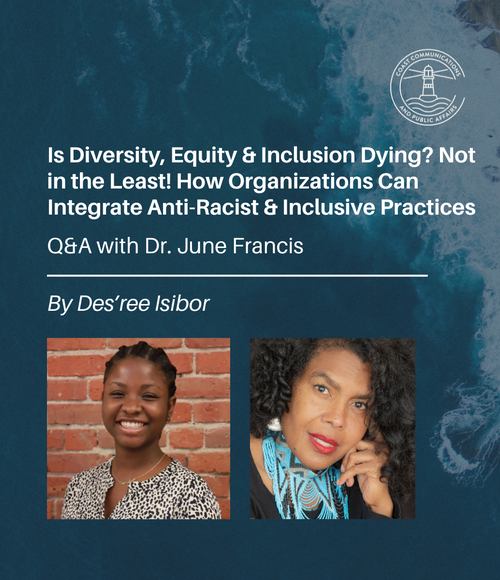Periodically, Coast Communications and Public Affairs interviews experts in our field (and beyond) to provide a point of view on a key issue that also impacts communications. In this edition of Coast Insights Tamara talks to Pamela Findling, the Director of Communications for Capilano University, about how employees are asking for changes in how organizations respond to global issues. She has held other senior roles in communications and has a passion for employee and internal communications.
Tamara: Hi Pam – lovely to catch up with you. It’s been a tough few months for universities in terms of navigating how to speak about the atrocities happening on and after October 7 in the Middle East. A lot of the impetus and call for comment came from campuses across Canada and beyond, including from faculty and employees. What have you seen change over the last few years in terms of employee’s expectations for their employers to have a point of view on external or even global events?
Pamela: I’d say that eight years ago, employees rarely called to comment on things happening external to their organizations. But as we’ve seen the popularity of social media platforms rise, so have employees been calling on employers to comment on bigger issues. And now employers, at universities and beyond, are being bombarded.
Tamara: Why do you think that is?
Pamela: People hearing the same point of view all the time is a big part of it. It’s an echo chamber of reinforcement and people are often seeing only one point of view in their feeds. And increasingly the point of view is more definite, with people increasingly upset about a topic.
But I’d also say that in the last three years, we’ve seen employees increasingly looking to their employers to confirm that the organization’s values align with their own. And with this has come a trend of calling on workplaces to issue statements, be they of support or opposition. Examples are the war by Russia in Ukraine, #BLM and Pride Week. And of course, October 7th and the ongoing war in the Middle East.
Tamara: How does this also link to employees' and employers' growing interest and commitment to diversity, equity and inclusion (DEI)?
Pamela: Absolutely. The essential and very valuable increase in DEI work comes with it a call to hold employers accountable to deliver on those values.
Tamara: What has been your solution to ensuring you on are on the right track? To avoid being in a tough spot and making the news (in a bad way)?
Pamela: Our initial response was to provide information: point to resources, acknowledge how people feel about the issue, offer counselling, event, books…That worked for a little while. But if you do this every month, it doesn’t seem authentic.
What is now increasingly happening out there is organizations are developing criteria for how and when to respond, personalizing it to their needs. And asking: why are we choosing to speak about an issue? Is it because it links to people at our organization, or an initiative, or aligns to our values. It’s not a science but we are working on defining and communicating what that criteria is.
Tamara: So, no more having a point of view on everything if your organization has no link to it?
Pamela: Exactly. It’s still challenging because some might say, “You aren’t doing anything,” but it helps us be more consistent. But certainly, we no longer assume everything will have a statement. It might be more about empowering organization leaders to communicate more directly, have conversations directly with people who are impacted, and offer their support and resources.
Tamara: What is our role as communicators in this? Does responsibility rest with us or with other executive functions like HR?
Pamela: Our role as communications leaders is to establish criteria and protocols and advise, but ultimately, senior executives have to decide. We can also help by saying, " Let’s take a breath and wait and think about the next steps” rather than encouraging a fast response.
Comms professionals also know audiences better than any other executive function and know how things will “land.” And as strategists we are focused on our ultimate goals and how to achieve them. For example, if our goal is safety and support then a statement isn’t the way to go – more direct support to people may be better.
Tamara: We did a blog post recently on avoiding the performative when issuing statements or Instagram posts. We agree the end goal should be considered carefully.
Pamela: Exactly. What comms does well is knowing the issue and then helping get a general agreement before we go out and talk about topics, whatever they may be.
Tamara: Thanks for this – it was perfect timing chatting with you because these are things we’ve been talking to clients about as well.



